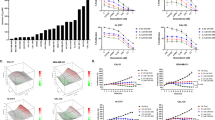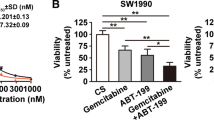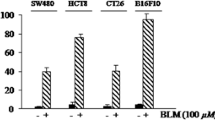Abstract
Purpose
Protein kinase C (PKC) plays an important role in cell proliferation, differentiation, and apoptosis. The interaction between the PKC modulator bryostatin 1 (BRYO), and gemcitabine in human breast cancer MCF-7 and MDA-MB-231 cells and in the non-transformed MCF-10A human breast epithelial cells was investigated.
Methods
Immunoblotting was used to determine the expression of PKC isoenzymes and proteins involved in the cell cycle and apoptosis. MTT, ELISA and flow cytometry assays were used to determine cell survival.
Results
Treatment of cells with BRYO 200 nM resulted in a significant downregulation of cytoplasmic PKC in all three cell lines. However, the expression of membranous PKC was differentially affected in these cells. BRYO (1–200 nM) had no significant effects on cell viability in any of the cell lines. Nevertheless, BRYO significantly enhanced the antiproliferative and apoptotic effects of gemcitabine in the MCF-7 and MDA-MB-231 cells, but not in the MCF-10A cells. This was associated with significant reduction in the bcl-2/bax ratio. There was a significant upregulation of p53, p21waf1, and p27 in MCF7 and MCF-10A cells treated with the combination of gemcitabine and BRYO compared to gemcitabine-treated cells.
Conclusions
The potentiation of the effect of gemcitabine by BRYO was demonstrated in MCF-7 and MDA-MB-231 cells and was associated with a specific pattern of PKC modulation. Further investigation of the role of specific isoforms of PKC in the downstream molecular events of gemcitabine-induced cytotoxicity is warranted.









Similar content being viewed by others
References
Asaoka Y, Nakamura S, Yoshida K, and Nishizuka Y (1992) Protein kinase C, calcium and phospholipid degradation. Trends Biochem Sci 17:414
Barr LF, Campbell SE, Baylin SB (1997) Protein kinase C-beta 2 inhibits cycling and decreases c-myc-induced apoptosis in small cell lung cancer cells. Cell Growth Differ 8:381
Basu A, Lazo JS (1992) Sensitization of human cervical carcinoma cells to cis-diamminedichloroplatinum (II) by bryostatin 1. Cancer Res 52:3119
Beltran PJ, Fan D, Fidler IJ, O'Brian CA (1997) Chemosensitization of cancer cells by the staurosporine derivative CGP 41251 in association with decreased P-glycoprotein phosphorylation. Biochem Pharmacol 53:245
Bouffard DY, Momparler RL (1995) Comparison of the induction of apoptosis in human leukemic cell lines by 2′,2′-difluorodeoxycytidine (gemcitabine) and cytosine arabinoside. Leuk Res 19:849
Cabot MC, Zhang Z, Cao H, Lavie Y, Giuliano AE, Han TY, Jones RC (1997) Tamoxifen activates cellular phospholipase C and D and elicits protein kinase C translocation. Int J Cancer 70:567
Carmichael J, Mitchell JB, DeGraff WG, Gamson J, Gazdar AF, Johnson BE, Glatstein E, Minna JD (1985) Chemosensitivity testing of human lung cancer cell lines using the MTT assay. Br J Cancer 57:540
Carmichael J, Possinger K, Phillip P, Beykirch M, Kerr H, Walling J, Harris AL (1995) Advanced breast cancer: a phase II trial with gemcitabine. J Clin Oncol 13:2731
Cartee L, Kucera GL (1998) Gemcitabine induces programmed cell death and activates protein kinase C in BG-1 human ovarian cancer cells. Cancer Chemother Pharmacol 41:403
Cartee L, Kucera GL (2000) Protein kinase C modulation and anticancer drug response. Cancer Invest 18:731
Chen G, Manji HK, Hawver DB, Wright CB, Potter WZ (1994) Chronic sodium valproate selectively decreases protein kinase C alpha and epsilon in vitro. J Neurochem 63:2361
Deacon EM, Pongracz J, Griffiths G, Lord JM (1997) Isoenzymes of protein kinase C: differential involvement in apoptosis and pathogenesis (review). Mol Pathol 50:124
Frey MR, Saxon ML, Zhao X, Rollins A, Evans SS, Black JD (1997) Protein kinase C isozyme-mediated cell cycle arrest involves induction of p21 (waf1/cip1) and p27 (kip1) and hypophosphorylation of the retinoblastoma protein in intestinal epithelial cells. J Biol Chem 272:9424
Gordge PC, Hulme MJ, Clegg RA, Miller WR (1996) Elevation of protein kinase A and protein kinase C activities in malignant as compared with normal human breast tissue. Eur J Cancer 32A:2120
Grant S (1997) Modulation of ara-C induced apoptosis in leukemia by the PKC activator bryostatin 1. Front Biosci 2:d242
Grant S, Jarvis WD (1996) Modulation of drug-induced apoptosis by interruption of the protein kinase C signal transduction pathway: a new therapeutic strategy. Clin Cancer Res 2:1915
Han EK, Cacace AM, Sgambato A, Weinstein IB (1995) Altered expression of cyclins and c-fos in R6 cells that overproduce PKC epsilon. Carcinogenesis 16:2423
Holm S (1979) A simple sequentially rejective multiple test procedure. Scand J Statist 6:65
Huang P, Plunkett W (1995) Induction of apoptosis by gemcitabine. Semin Oncol 22:19
Itano Y, Ito A, Uehara T, Nomura Y (1996) Regulation of Bcl-2 protein expression in human neuroblastoma SH-SY5Y cells: positive and negative effects of protein kinases C and A, respectively. J Neurochem 67:131
Jarvis WD, Grant S (1999) Protein kinase C targeting in antineoplastic treatment strategies. Invest New Drugs 17:227
Jarvis WD, Povirk LF, Turner AJ, Traylor RS, Gewirtz DA, Pettit GR, Grant S (1994) Effects of bryostatin 1 and other pharmacological activators of protein kinase C on 1-[beta-D-arabinofuranosyl]cytosine-induced apoptosis in HL-60 human promyelocytic leukemia cells. Biochem Pharmacol 47:839
Jarvis WD, Fornari FA, Traylor RS, Martin HA, Kramer LB, Erukulla RK, Bittman R, Grant S (1996) Induction of apoptosis and potentiation of ceramide-mediated cytotoxicity by sphingoid bases in human myeloid leukemia cells. J Biol Chem 271:8275
Jemal A, Thomas A, Murray T, Thun M (2002) Cancer statistics, 2002. CA Cancer J Clin 52:23
Jeoung DI, Tang B, Sonenberg M (1995) Induction of tumor suppressor p21 protein by kinase inhibitors in MCF-7 cells. Biochem Biophys Res Commun 214:361
Kennedy MJ, Prestigiacomo LJ, Tyler G, May WS, Davidson NE (1992) Differential effects of bryostatin 1 and phorbol ester on human breast cancer cell lines. Cancer Res 52:1278
Mihalik R, Farkas G, Kopper L, Benczur M, Farago A (1996) Possible involvement of protein kinase C-epsilon in phorbol ester-induced growth inhibition of human lymphoblastic cells. Int J Biochem Cell Biol 28:925
Mohammad RM, al-Katib A, Pettit GR, Sensenbrenner LL (1994) Successful treatment of human Waldenstrom's macroglobulinemia with combination biological and chemotherapy agents. Cancer Res 54:165
O'Brian C, Vogel VG, Singletary SE, Ward NE (1989) Elevated protein kinase C expression in human breast tumor biopsies relative to normal breast tissue. Cancer Res 49:3215
Philip PA, Harris AL (1995) Potential for protein kinase C inhibitors in cancer therapy. In: Muggia FM (ed) Concepts, mechanisms, and new targets for chemotherapy (Cancer Treatment and Research, 78). Kluwer Academic Publishers, Boston, p 3
Philip PA, Rea D, Thavasu P, Carmichael J, Stuart NS, Rockett H, Talbot DC, Ganesan T, Pettit GR, Balkwill F, et al (1993) Phase I study of bryostatin 1: assessment of interleukin 6 and tumor necrosis factor alpha induction in vivo. The Cancer Research Campaign Phase I Committee. J Natl Cancer Inst 85:1812
Prendiville J, Crowther D, Thatcher N, Woll PJ, Fox BW, McGown A, Testa N, Stern P, McDermott R, Potter M, et al (1993) A phase I study of intravenous bryostatin 1 in patients with advanced cancer. Br J Cancer 68:418
Ruvolo PP, Deng X, Carr BK, May WS (1998) A functional role for mitochondrial protein kinase Calpha in Bcl2 phosphorylation and suppression of apoptosis. J Biol Chem 273:25436
Schwaller J, Peters UR, Pabst T, Niklaus G, Macfarlane DE, Fey MF, Tobler A (1997) Up-regulation of p21WAF1 expression in myeloid cells is activated by the protein kinase C pathway. Br J Cancer 76:1554
Slosberg ED, Klein MG, Yao Y, Han EKH, Schieren I, Weinstein IB (1999) The alpha isoform of protein kinase C mediates phorbol ester-induced growth inhibition and p21(cip1) induction in HC11 mammary epithelial cells. Oncogene 18:6658
Stabel S (1994) Protein kinase C—an enzyme and its relatives. Semin Cancer Biol 5:277
Whelan RD, Parker PJ (1998) Loss of protein kinase C function induces apoptotic response. Oncogene 16:1934
Zonder J, Philip PA (1999) Pharmacology and clinical experience with bryostatin 1: a novel anticancer drug. Expert Opin Invest Drugs. 8: 2189
Zonder J, Shields AF, Zalupski M, Chaplen R, Heilbrun LK, Philip PA (2001) A phase II trial of bryostatin 1 in the treatment of metastatic colorectal cancer. Clin Cancer Res 7:38
Author information
Authors and Affiliations
Corresponding author
Rights and permissions
About this article
Cite this article
Ali, S., Aranha, O., Li, Y. et al. Sensitization of human breast cancer cells to gemcitabine by the protein kinase C modulator bryostatin 1. Cancer Chemother Pharmacol 52, 235–246 (2003). https://doi.org/10.1007/s00280-003-0628-6
Received:
Accepted:
Published:
Issue Date:
DOI: https://doi.org/10.1007/s00280-003-0628-6




